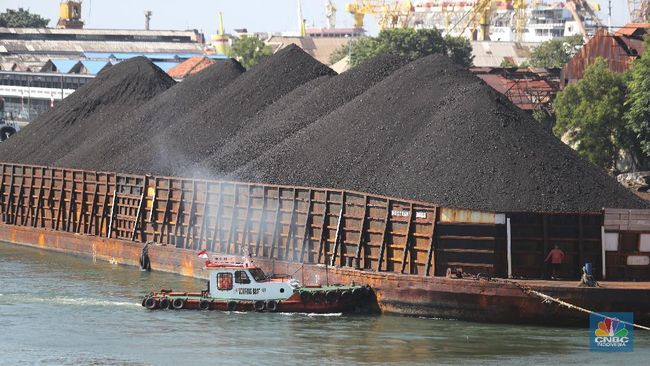Jakarta, CNBC Indonesia – Along with the electricity crisis and the depletion of coal supplies, China needs to increase supply to avoid the risk of an economic slowdown in the fourth quarter of this year. However, Beijing’s deteriorating relationship with Australia could complicate the Bamboo Curtain country’s targets.
Launch CNBC InternationalThe world’s second-largest economy is facing a power shortage due to a combination of factors, such as extreme weather, a surge in demand for Chinese exports and a national push to reduce carbon emissions, as President Xi Jinping has set out.
As is well known, China is an industrial powerhouse and the largest emitter of carbon dioxide on the planet. The country generates most of its electricity using coal, but currently inventories of major power plants hit a 10-year low in August.
“While China clearly needs as much coal as it can get its hands on to prevent a slowdown [kuartal keempat] because of the tyranny of power shortages, geopolitical tensions with Australia have prevented the Southern Hemisphere’s best sources of high-calorie coal [Australia],” said Vishnu Varathan, head of economics and strategy for the Asia and Oceania treasury department at Mizuho, reported by CNBC International, quoted by CNBC Indonesia, Tuesday (5/10/2021).
Late last year, China stopped buying coal from Australia – once the country’s biggest exporter of the commodity. It comes as trade tensions between the two countries soared, after Australia backed calls for an international investigation into China’s handling of the coronavirus (Covid-19).
As a result, China turned to Indonesia, Mongolia, Russia, and other countries to try to make up for the shortfall. Last year, reports said that Indonesian coal miners signed a US$1.5 billion supply deal with China.
Varathan explained, Indonesia is in a strategic position to benefit from abundant demand, but its ability to meet shipments may be a bottleneck.
China faces risks in quickly filling its coal stockpiles due to various constraints, including logistics and regulations. This implies, “a kind of stuttering in economic activity and the accompanying intricacies in regional supply chains may not be completely unavoidable,” Varathan added.
As an illustration, pIn 2020, Indonesia’s coal exports to China reached 127.78 million tons or around 31.5% of the total national coal exports which reached 405.05 million tons. Meanwhile, exports to India reached 97.51 million tons and to Japan 26.97 million tons.
The highest Indonesian coal exports to China occurred in 2019 before the Covid-19 pandemic hit the world, reaching 144.41 million tons.
Inflation pressure
Several banks have downgraded China’s growth prospects in the wake of the electricity crisis.
Varathan continued, many observers seem concerned about the ‘significant level of energy price shock’.
Meanwhile, Kevin Xie, senior Asia economist at the Commonwealth Bank of Australia, argued that China’s electricity crisis could lead to price increases for many export goods, which could lead to a slight increase in consumer inflation in developed countries.
Xie explained that limited electricity supply would cut economic growth and exacerbate the slowdown caused by problems in China’s housing construction sector – namely, the case of China Evergrande’s liquidity crisis.
“Energy-intensive industries will be most affected by electricity rationing. The combined share of the industrial sector in the provinces affected by electricity rationing is about 14% of China’s GDP,” Xie added.
So far, policymakers in Beijing have given no indication of whether China will resume imports of Australian coal. Media reports last week said Indian companies were sourcing about 2 million tonnes of Australian coal at discounted prices stored in Chinese warehouses.
A number of Coal Stock Prices Ambled
After successfully recording an upward rally in the last few days, a number of coal stocks began to take profit-taking. The following are some of the coal stocks that fell, referring to data from the Indonesia Stock Exchange (BE) at 14.33 WIB.
-
Borneo Olah Sarana Sukses (BOSS), -4.42% shares, to Rp 108/share
-
Atlas Resources (ARII), -3.61%, to Rp 320/share
-
Golden Eagle Energy (SMMT), -3.60%, to IDR 214/share
-
Main Energy TBS (TOBA), -2.52%, to Rp 580/share
-
Delta Dunia Makmur (DOID), -2.29%, to Rp 342/share
-
Adaro Energy (ADRO), -2.15%, to Rp 2,830/share
-
Bukit Asam (PTBA), -2.08%, to Rp 2,830/share
-
United Tractors (UNTR), -1.85%, to Rp 26,600/share
-
Harum Energy (HRUM), -1.80%, to Rp 8,175/share
-
Alfa Energi Investama (FIRE), -1.49%, to Rp 660/share
-
Indika Energy (INDY), -1.40%, to Rp 2,120/share
According to the data above, BOSS shares fell the most, at 4.42%, after jumping 13.00% yesterday. INDY shares became the smallest weakening, namely 1.40%, after 3 days of high streak.
Yesterday, the price of coal on the ICE Newcastle (Australia) market was recorded at US$ 247/ton. Soared 9.41% over the previous day’s position as well as being the highest record since at least 2008.
The increase in coal prices is indeed extraordinary. In the past week, prices rose 25.97% on a point-to-point basis. Since the end of 2020 (year-to-date), the price of the black stone has skyrocketed by 183.23%.
CNBC INDONESIA RESEARCH TEAM
(adf/adf)
– .


